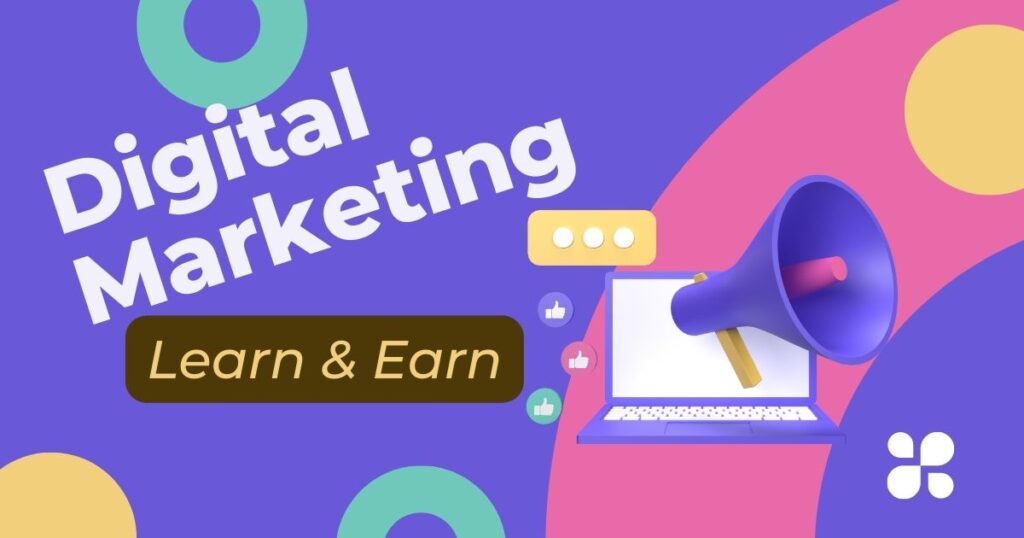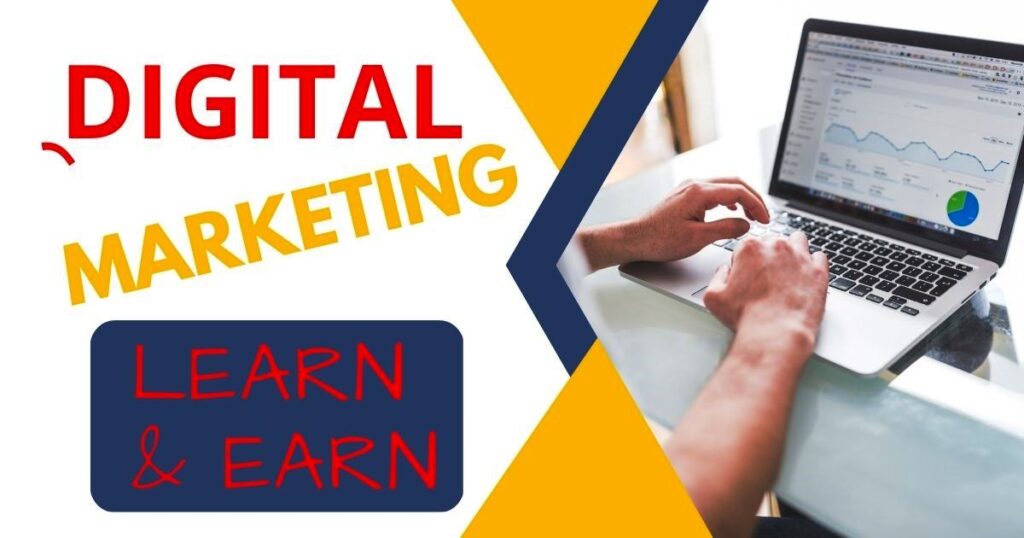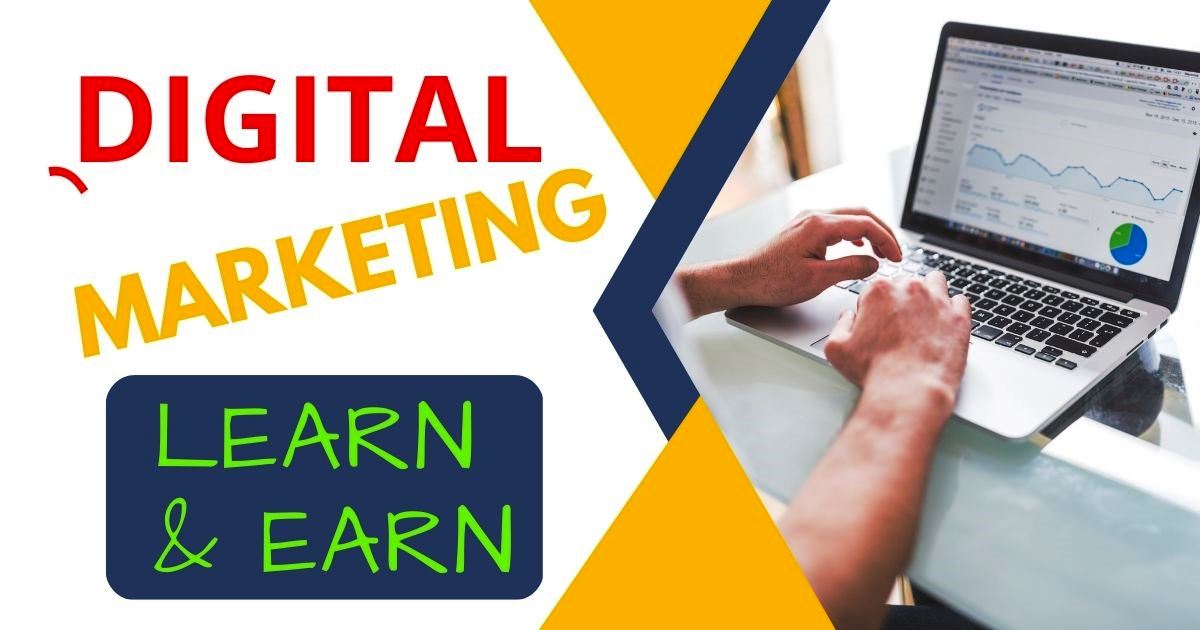In this article, I will give you information about Digital Marketing from the beginning and after reading this, you can make it as your Career. After getting information about this, you can earn as much money as you want, why nowadays Digital Marketing has become a good Career Option. After learning this you can’t remain unemployed. After coming in this field, you have only option, whether you can do job or you can set up a good business on your own, in which you can also provide jobs to the youths as well.
Article Version- In Hindi https://bloggingtemple.com/digital-marketing-kya-hai-learn-earn
Table of Contents

What Is Digital Marketing
Digital marketing is the process of promoting products and services using the Internet, websites, social media, email and other digital mediums. It is used during marketing to attract customers, enhance brand recognition, provide customer communication facilities, communicate with customers and increase sales. It opens up new dimensions which helps in building customer relationship, increasing marketing leads and getting new opportunities for business. It is not a big bug it can be done religiously based on market understanding, marketing plan, customer consideration and customer experience.
It refers to the use of digital channels and technologies to promote products, services, or brands to a target audience. It involves leveraging online platforms, tools, and strategies to reach, engage, and convert potential customers into paying customers. It encompasses a wide range of tactics and techniques, including but not limited to search engine optimization (SEO), pay-per-click (PPC) advertising, social media marketing, content marketing, email marketing, influencer marketing, mobile marketing, video marketing, and display advertising.
In summary, It can be understood through the digital channels and technologies to promote products, services, or brands online with the aim of reaching, engaging, and converting potential customers. It has become an essential part of modern marketing strategies, allowing businesses to effectively market their offerings in the digital age. It is explained in simple terms that it can help new users and businesses to understand the basic concepts of Digital Marketing.
Importance of Digital Marketing
The Importance of Digital Marketing for businesses in today’s digital age can be understood through the following reasons:
Wider Reach: Digital marketing allows businesses to reach a global audience, transcending geographical boundaries. With the increasing usage of the internet and mobile devices, businesses can target potential customers across different digital channels such as search engines, social media, websites, and more. This wide reach provides businesses with the opportunity to tap into new markets and expand their customer base.
Targeted and Personalized Marketing: It enables businesses to segment their target audience and create personalized marketing campaigns based on user behavior, interests, demographics, and preferences. This allows for highly targeted and relevant marketing efforts, resulting in higher engagement, better customer experience, and increased chances of conversions.
Cost-effective: It can be more cost-effective compared to traditional marketing methods. Businesses can optimize their marketing budgets by choosing specific digital channels and tactics that align with their goals and budget. Additionally, digital marketing platforms often provide tools for measuring the performance of campaigns in real-time, allowing for efficient allocation of resources and optimization of marketing efforts.
Measurable Results: Digital marketing provides businesses with the ability to track and measure the effectiveness of their marketing campaigns in real-time. With analytics and tracking tools, businesses can gain insights into various performance metrics such as website traffic, engagement, conversions, and ROI. This data-driven approach allows for data-based decision making and continuous optimization of marketing strategies for better results.
Flexibility and Agility: It offers businesses the flexibility to quickly adapt and adjust their marketing strategies based on market changes, customer feedback, or emerging trends. This allows businesses to be more agile in their marketing efforts and stay ahead of the competition.
Enhanced Customer Engagement: It provides businesses with opportunities to engage with customers in a more interactive and two-way manner. Through social media, email marketing, content marketing, and other digital channels, businesses can actively communicate with customers, build relationships, and address their concerns. This fosters customer loyalty, brand advocacy, and repeat business.
Brand Building and Awareness: It plays a crucial role in building and enhancing brand awareness. Through consistent branding across various digital channels, businesses can create a strong brand presence, increase brand recall, and establish themselves as industry leaders. This helps in building trust and credibility among potential customers, leading to increased brand loyalty and customer retention.
In conclusion, Digital Marketing is crucial for businesses in today’s digital-driven world. It provides wider reach, targeted marketing, cost-effectiveness, measurable results, flexibility, enhanced customer engagement, and brand building opportunities. Businesses that embrace digital marketing can gain a competitive advantage and effectively connect with their target audience in the digital landscape.

Learn to Improve your knowledge: https://www.binaryeducation.in/
Digital Marketing Strategies
Digital Marketing encompasses various strategies and techniques that leverage digital channels to promote products, services, or brands. Some common types of digital marketing include:
1.Search Engine Optimization (SEO):
SEO is the practice of optimizing websites or online content to improve their visibility in search engine results pages (SERPs) organically. This involves optimizing website structure, content, and technical elements to improve search engine rankings and increase organic traffic.
Learn SEO- https://bloggingtemple.com/search-engine-optimization-full-guide
2. Pay-Per-Click (PPC) Advertising:
PPC advertising involves placing ads on search engine results pages or other websites, and advertisers only pay when users click on their ads. Popular PPC platforms include Google Ads, Bing Ads, and social media advertising platforms like Facebook Ads, Instagram Ads, and Twitter Ads.
3.Social Media Marketing:
Social media marketing involves using social media platforms like Facebook, Instagram, Twitter, LinkedIn, and others to promote products, services, or brands, engage with customers, and build brand awareness. It includes activities such as posting content, running social media ads, and engaging with users.
4. Content Marketing:
Content marketing involves creating and sharing valuable and relevant content, such as blog posts, articles, videos, infographics, and more, to attract and engage a target audience. Content marketing aims to build brand authority, increase website traffic, and generate leads.
5. Email Marketing:
Email marketing involves sending targeted emails to a group of subscribers who have given consent to receive emails from a business. Email marketing can be used for various purposes, including promoting products, nurturing leads, building customer loyalty, and driving conversions.
6. Influencer Marketing:
Influencer marketing involves partnering with influencers or popular individuals on social media who have a large following and influence over their audience. Businesses collaborate with influencers to promote their products or services to their followers, leveraging the influencer’s authority and reach.
7. Affiliate Marketing:
Affiliate marketing involves partnering with affiliates who promote a business’s products or services and earn a commission for each sale or conversion they generate. Affiliates promote the products or services on their websites, blogs, or social media, using special tracking links to earn commissions.
8. Mobile Marketing:
Mobile marketing involves optimizing marketing strategies and campaigns for mobile devices, including smartphones and tablets. This can include mobile-optimized websites, mobile apps, SMS marketing, and in-app advertising.
9. Video Marketing:
Video marketing involves creating and sharing videos to promote products, services, or brands. This can include videos for social media, YouTube, webinars, tutorials, testimonials, and more.
10. Display Advertising:
Display advertising involves placing graphical or visual ads on websites, blogs, apps, or social media platforms. Display ads can include banners, images, videos, or rich media, and they aim to attract attention and drive clicks.
These are some of the common types of digital marketing strategies used by businesses to promote their products, services, or brands online. The choice of its channels and strategies depends on various factors such as business goals, target audience, budget, and resources. A comprehensive digital marketing strategy often involves a combination of these types of it to achieve optimal results.
Learn SEO- https://bloggingtemple.com/search-engine-optimization-full-guide

How to Start Digital Marketing
Digital marketing can be started by following these simple steps:
- Define Your Goals:
Start by defining your digital marketing goals. What are you looking to achieve with your digital marketing efforts? Examples of common goals include increasing website traffic, generating leads, improving brand awareness, driving sales, or boosting engagement on social media. Clearly defining your goals will help you create a focused and effective digital marketing strategy.
2. Identify Your Target Audience:
Understanding your target audience is critical in digital marketing. Who are your ideal customers? What are their demographics, interests, behaviors, and preferences? Conduct market research and create buyer personas to gain a deep understanding of your target audience, as this will guide your digital marketing efforts in terms of messaging, content creation, and channel selection.
3. Choose Digital Marketing Channels:
There are numerous digital marketing channels available, including search engine optimization (SEO), pay-per-click (PPC) advertising, social media marketing, content marketing, email marketing, influencer marketing, mobile marketing, video marketing, and display advertising, among others. Choose the channels that are most relevant to your target audience and align with your goals and budget.
4. Create a Digital Marketing Plan:
Develop a comprehensive digital marketing plan that outlines your strategies, tactics, and timelines. Your plan should cover aspects such as content creation, social media posting schedule, advertising budgets, email marketing campaigns, SEO optimization, and other relevant activities. Having a plan in place will help you stay organized and focused in your digital marketing efforts.
5. Create Engaging Content:
Content is a crucial component of digital marketing. Create high-quality, relevant, and engaging content that resonates with your target audience. This can include blog posts, articles, infographics, videos, social media posts, and more. Your content should provide value, address your audience’s pain points, and align with your brand messaging.
6. Optimize for Search Engines(SEO):
Search engine optimization (SEO) is essential for improving your website’s visibility in search engine results. Optimize your website and content for relevant keywords, meta tags, headings, and URLs. Focus on creating high-quality and authoritative content that provides value to users, and ensure your website is user-friendly, responsive, and loads quickly.
7. Leverage Social Media:
Social media platforms offer a powerful way to connect with your target audience, build brand awareness, and drive engagement. Choose the social media platforms that are most relevant to your target audience and create a consistent posting schedule. Share engaging content, respond to comments and messages, and use social media advertising to reach a wider audience.
8. Monitor and Analyze Results:
Regularly monitor and analyze the performance of your digital marketing efforts. Use analytics tools to measure key performance indicators (KPIs) such as website traffic, engagement, conversions, and ROI. Identify what’s working and what’s not, and make data-driven decisions to optimize your digital marketing strategies.
9. Stay Updated with Industry Trends:
It is a dynamic field, and it’s essential to stay updated with the latest industry trends, best practices, and technologies. Follow industry blogs, attend webinars, participate in relevant forums, and continuously educate yourself to stay ahead of the competition. Starting with a well-defined plan, creating engaging content, optimizing for search engines, leveraging social media, and regularly monitoring results are key steps to kickstart your digital marketing efforts. Remember, It is an ongoing process that requires continuous learning, testing, and optimization to achieve the best results.
FAQs:(Frequently Asked Questions)
Ans: It refers to promoting and advertising products or services using digital channels such as social media, email, search engines, and websites.
Ques2: What are the benefits of digital marketing?
Ans: It can help you reach a larger audience, increase brand awareness, generate leads, improve customer engagement, and track and analyze the effectiveness of your campaigns.
Ques3: What are the different types of digital marketing?
Ans: Some types of digital marketing include social media marketing, email marketing, search engine optimization (SEO), pay-per-click (PPC) advertising, content marketing, and influencer marketing.
Ques4: How do you create a digital marketing strategy?
Ans: To create a its strategy, you should define your target audience, set clear goals, choose the right channels, create valuable content, and measure the success of your campaigns.
Ques5: How can you measure the success of your digital marketing campaigns?
Ans: You can measure the success of your digital marketing campaigns by tracking metrics such as website traffic, conversion rates, click-through rates, email open rates, social media engagement, and ROI.
Ques6: What is SEO and why is it important for digital marketing?
Ans: SEO stands for search engine optimization and it involves optimizing your website to rank higher in search engine results. SEO is important for digital marketing because it can increase your website traffic and visibility.
Ques7: What is PPC advertising and how does it work?
Ans: PPC advertising is a type of online advertising where advertisers pay each time a user clicks on one of their ads. It involves creating ads and bidding on keywords to have your ads displayed in search engine results or on websites.
Ques8: How can you use social media for digital marketing?
Ans: You can use social media for digital marketing by creating and sharing valuable content, engaging with your audience, using paid advertising, and monitoring and analyzing your performance.
Ques9: What is content marketing and how can it benefit your business?
Ans: Content marketing involves creating valuable content to attract and engage your target audience. It can benefit your business by increasing brand awareness, generating leads, and building customer loyalty.
Ques10: How can email marketing be used effectively in digital marketing?
Ans: Email marketing can be used effectively in digital marketing by creating targeted and personalized email campaigns, segmenting your email list, and analyzing the effectiveness of your campaigns.
Ques11: What are some common mistakes to avoid in digital marketing?
Ans: Some common mistakes to avoid in digital marketing include not defining clear goals, targeting the wrong audience, not tracking and analyzing your campaigns, and not creating valuable and engaging content.
Ques12: What are some upcoming trends in digital marketing?
Ans: Some upcoming trends in digital marketing include the use of artificial intelligence, the rise of voice search, and the increasing importance of video marketing.
Ques13: How can you choose the right digital marketing channels for your business?
Ans: To choose the right digital marketing channels for your business, you should consider your target audience, your goals, and the channels that are most effective for reaching your audience.
Ques14: What is the role of analytics in digital marketing?
Ans: Analytics plays an important role in digital marketing by providing data and insights on the effectiveness of your campaigns. It can help you make data-driven decisions and optimize your marketing efforts.
Ques15: How can you stay up-to-date with changes in digital marketing?
Ans: You can stay up-to-date with changes in marketing by following industry blogs and thought leaders, attending conferences and events, and continuously learning and experimenting with new strategies and techniques.
***You Can also Visit the Following Links***
Exploring The Benefits of Electric Vehicles
Best Electric Cars in the Market
How to Learn Digital Marketing
Learn SEO (Search Engine Optimization)
Earn Using Mobile Phones (Mobile Marketing)


0 thoughts on “What Is Digital Marketing- How to Make Money Online | Learn in about 10 Easy Steps”